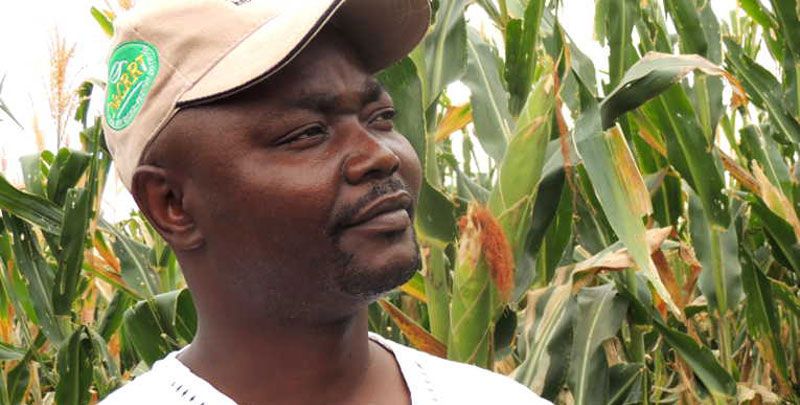
An experiment meant to evaluate the effectiveness of a resistant maize variety against the devastating maize stem borer developed by Ugandan researchers has proved successful in controlling yet another hazardous pest, the leaf eater that had proved a menace to farmers across the Uganda especially during the dry season.
According to local leaders from Kasese, one of the biggest maize growing districts in Uganda, farmers had become very worried about their future because of the enormous losses suffered due to the two pests.
The successes however of the Kasese based confined trial showed high levels of resistance against the maize stem borer that was developed through genetic engineering tools, is a source of hope for leaders and farmers that the pests will be defeated.
According to the ministry of agriculture, the maize stem borer costs farmers more than US$25m (Approximately Ushs90billion) annually in missed produce, let alone millions of money that is spent on spraying chemicals.
Scientists from Uganda’s National Crop Resources Research Institute (NaCRRI) at Namulonge told Kasese leaders that they achieved resistance against the stem borer by integrating a gene from the ubiquitous bacillus thuringiensis (BT) bacteria into the maize genome. The effect, scientists say, is that when the stem borer attempts to attack the maize, it dies off, without endangering the health of humans or animals that feed on the maize.
Currently grown in 16 countries world wide, BT maize has increased significantly in acreage and helped improve food security in several countries including Brazil, the United states, South Africa and Argentina. The Kenyan government recently gave the green light for an environmental release of BT maize, raising hope among scientists and supporters of GM technology of a major break through in the region.
Genetic engineering has however received a lot of criticism especially from European countries and European-based NGOs claiming that they cause diseases like cancer. The World Health Orgnaisation (WHO) however says that GM maize is not harmful to human health, as shown in their responses to WHO 20 Frequently Asked Questions on GMOs
Emboldened by the Kasese findings, Geoffrey Sibendire, the Kasese district chairman vowed to push government to pass the Biotechnology and Biosafety Bill 2012 to allow farmers to obtain the technology. The tour of the maize trial was organised by the Uganda Biotechnology Information Centre (UBIC).
Sibendire said: “I have been educated about the benefits of this technology and I am convinced that it is in our best interests to have it availed to farmers, otherwise there is no alternative to it.”
And when Sibendire and colleagues from the Kasese district council witnessed that BT maize was resistant to a new maize leaf minor, they became even more elated.
According to Gideon Ntabose, the secretary for production in Kasese district, maize farmers lost a lot of money trying to spray their gardens with pesticides to control both the stem borer and the leaf minor.
“This did not only expose them to the dangerous effects of chemical use but also cost them a lot of money, which some some farmers didn’t have,” said Ntabose.
Stephen Kaboyo, a research officer in Cereals at NaCRRI, Namulonge told Kasese leaders that due to the prolonged drought experienced last year, most maize farmers across the country suffered unusually heavy losses from pests, let alone losses arising from water scarcity.
According to the Ministry of Agriculture, farmers across the country lost about 50 percent of their maize produce to drought alone. Accompanying losses arising from increased prevalence of pests such as increased chances of aflatoxin infestation on damaged cobs therefore, have compounded the problem.
Kaboyo pleaded with Kasese leaders to put pressure on the government and district representatives in Parliament to expedite the passing of the biotechnology law arguing that it will not only provide solutions to farmers, but will also help to safeguard the country against importation and cultivation of unregulated seeds.
The 2012 biotechnology and biosafety bill has faced resistance from civil society groups and it is believed that their influence greatly contributed to it failing to get passed into law by the previous 9th Parliament.
With nearly two thirds of MPs now new, scientists are grappling with new challenges of sensitizing the new legislators afresh so that they can be able to make informed decisions and perhaps abandon most of the myths and negative stereo types that have surrounded GM crops over the recent few years.
Kenya’s progress however, in advancing BT maize research, argues Kaboyo, will inject a new sense of urgency among Uganda’s policy makers and politicians about the need to have a law.
As Jackson Mbaju, the MP for Busongora South pointed out, delay in embracing discoveries of Ugandan scientists would render the country less competitive in the region since neighbouring countries will have adopted better and cheaper methods of production.














Sunrise reporter
Leave a Comment
Your email address will not be published.